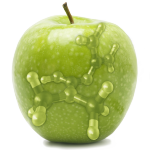Cancer is a metabolic disease. So asserts a growing body of evidence, supported by twin pillars. On one hand is strong data from population studies showing that those with metabolic disorders, such as obesity and diabetes, have altered risks of specific types of cancer. Elio Riboli, Director of the School of Public Health at Imperial College London, lists the cancers associated with obesity in a revealing interview for BMC Biology: breast post-menopausal, colorectal, endometrium, kidney, adenocarcinoma of the esophagus and cardia, and prostate (tentatively).
The second line of evidence is the severe metabolic dysfunction within cancer cells. Familiar oncogenes such as c-myc, that are known to drive forward cancer growth, are now known to also reprogram cellular metabolism. This is not just to produce energy for the developing tumor, but also to create building blocks – proteins, nucleic acids and lipids. Metabolism could be cancer’s Achilles’ heel, explains medical geneticist and pediatrician Ralph DeBerardinis to new journal Cancer & Metabolism, as he describes diagnostics and therapies that take advantage of this altered property of tumors.
The mechanism by which obesity and cancer are linked is far from clear. Even more murky is evidence linking diet and cancer. Cancer Research UK have a useful list of foods to avoid and encourage. On the good list are fruit and vegetables, fiber and fish, which reduce your risk of cancer, particularly of the bowel. The bad list is somewhat longer and includes processed meat (increased risk of bowel and stomach cancer), salty food (increased risk of stomach and nasopharyngeal cancer) and saturated fat (some evidence of increased risk of breast cancer).
A study published yesterday in Cancer & Metabolism shows that leucine supplements, an amino acid popular amongst body builders, drives pancreatic cancer growth in a mouse model. Stephen Hursting, who carried out the study, is a leading researcher on links between diet and cancer and gave his views on the obesity-cancer connection in a panel discussion in 2012. His recent study is especially important as leucine is used to treat cachexia, a form of muscle wasting that is a common cause of death in cancer patients. Branched chain amino acids such as leucine are effective in driving muscle growth in body builders and cancer patients alike, through activation of the mTOR pathway. But mTOR also aids growth of the pancreatic tumor, at least in lean mice; in overweight mice leucine supplements led to cancer growth through a different mechanism, by increasing the availability of sugar.
 This leads us to ask – is cancer preventable? Can we reduce our cancer risk by changing our diet? The answer is far from clear, but will be the focus of a panel discussion at the upcoming Metabolism, Diet and Disease conference in Washington DC this May, where both Drs Riboli and DeBerardinis are speaking. It seems unlikely that a clear conclusion will be reached, but yet more evidence on the life-saving properties of fruit and vegetables show that if in doubt, stick to the 150-year old public health message – an apple a day keeps the doctor away.
This leads us to ask – is cancer preventable? Can we reduce our cancer risk by changing our diet? The answer is far from clear, but will be the focus of a panel discussion at the upcoming Metabolism, Diet and Disease conference in Washington DC this May, where both Drs Riboli and DeBerardinis are speaking. It seems unlikely that a clear conclusion will be reached, but yet more evidence on the life-saving properties of fruit and vegetables show that if in doubt, stick to the 150-year old public health message – an apple a day keeps the doctor away.
Comments